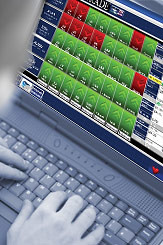When you hear the term "stock trading", you might be inclined to think of it as a financial-based game of trading baseball cards. "Trading" actually means buying or selling (or both). Having a better understanding of how trading, and the stock market works, can better prepare you for investing with confidence. Here are the basics of stock trading that every savvy investor needs to know.
Traditional Trading Versus Electronic Trading
Traditionally, all trades were handled on the exchange floor (such as the NYSE or New York Stock Exchange), and many still are. The perception most people have of stock trading involves lots of chaotic gestures, people manning the phones and poring over computers and television monitors, crunching data and buying and selling in a frenzy. Yet it all works out perfectly in the end thanks to the marvel of the market.
In its simplest form, you tell your broker what stock to buy and how many shares. Your broker then sends the order down to a floor clerk on the exchange floor who finds another firm's trader and a price is negotiated. The sale is completed and the details go back up the line. It can take anywhere from a few minutes to an hour or more, depending on the complexity of the trade. You'll then get a confirmation in the mail about your purchase.
Sound slow? It can seem that way, especially when you consider that we have the number crunching and online connective power of computers. Electronic trading has surged in popularity recently, simply because it enables the first-time or hobbyist trader to trade alongside more experienced investors and brokers, using the simplicity and efficiency of the internet.
Electronic stock trading works similarly to the traditional exchange floor, except computer networks match buyers and sellers online. The NASDAQ handles its entire exchange electronically, in comparison to the NYSE on the fast-paced exchange floor. You fund your electronic account with a bank wire transfer or credit card, and can set it up to be funded automatically at different intervals, so you'll never miss out on a hot stock trade for lack of funds.
It's important to note that even when you're trading electronically, you still need a broker, simply because the public doesn't have direct access to the markets. An online brokerage firm, such as Firstrade, can help you set up an account online instantly and start trading stocks quickly and seamlessly through the web. The entire process is secure and straightforward, and many online stock trading companies have a wide variety of resources that can help you learn more about the trading process, plus give you tips on buying and selling.
As you can see, stock trading is more about "buy low and sell high", although that old adage still applies whether you're negotiating on the floor or over a broadband connection. Thanks to the wide range of interconnected markets, it's never been easier for anyone, with any level of experience, to start reaping the benefits of trading stocks.
John Hutchison is an experienced trader and author. Based in New York, he writes about online stock trading and advice on investing your money. His favorite pastime is instructing new traders and he saves his best tips for his introductory stock trading page: http://www.squidoo.com/online-stock-market-trading-for-beginners.
do investor relations firms recommend penny stock promoters for penny stock tips?

No comments:
Post a Comment